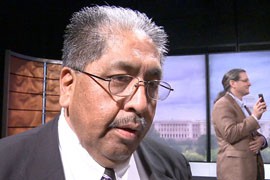Cronkite News has moved to a new home at cronkitenews.azpbs.org. Use this site to search archives from 2011 to May 2015. You can search the new site for current stories.
Tohono O’odham vow to fight House vote to block casino near Glendale
WASHINGTON – Tohono O’odham leaders vowed to continue their fight for a Glendale-area casino after the House overwhelmingly approved a bill blocking their plans Tuesday.
The House voted 343-78 for the Gila Bend Indian Reservation Lands Replacement Clarification Act, one day after a bitter debate in which each side accused the other of setting dangerous precedent on the issue.
A tribal leader was not deterred by the vote. Tohono O’odham Nation Chairman Ned Norris Jr. in a prepared statement that the tribe would continue to fight the bill as it moves to the Senate.
“We remain committed to moving forward with our project and creating positive economic opportunity in the West Valley,” Norris’ statement said.
Supporters of the measure said Monday that the bill will stop “reservation shopping” by tribes looking for profitable locations for casinos. But opponents said passing the bill would represent just another broken promise to Native Americans, one that will open the government to legal action.
The bill, introduced in September by Rep. Trent Franks, R-Glendale, is the latest in several years of legal and legislative efforts to block the project.
It stems from the 1986 Gila Bend settlement, under which the federal government agreed to let the Tohono O’odham acquire land to replace about 10,000 acres of tribal farmland that was flooded by a federal project.
As part of that settlement, the tribe began taking steps in 2003 to purchase nearly 135 acres near Glendale. The tribe later asked the Department of the Interior to put 54 of those acres into trust, which would allow gaming.
According to Tohono O’odham officials, the casino would create thousands of jobs, and create hundreds of millions of dollars in annual positive economic impact. They claim the project has consistently received overwhelming support from West Valley voters, with 75 percent favoring the project.
But Franks has repeatedly questioned the tribe’s economic numbers, arguing Monday that any small benefit to the city would be far outweighed by the expenses it would incur providing services to a casino.
He said the tribe has attempted to manipulate the 1986 agreement – the Gila Bend Indian Reservation Lands Replacement Act that his bill seeks to clarify – to acquire lands for gambling that are more than 100 miles from its reservation. That is something he said the Tohono O’odham previously agreed they would never do.
Franks also said the tribe’s plans to open another casino violate state law, Proposition 202, that limits the number of tribal casinos in the Valley to seven – the current number operating.
But Rep. Raul Grijalva, D-Tucson, disagreed, saying that the “very tribes supporting this legislation have built two additional casinos” in the Phoenix area since the passage of the law and are merely trying to block competition from a new Tohono O’odham facility.
Grijalva said that when Congress signed the Gila Bend agreement, it guaranteed that the Tohono O’odham Nation could obtain replacement lands without restrictions on the use of that land, including the possibility of a casino.








